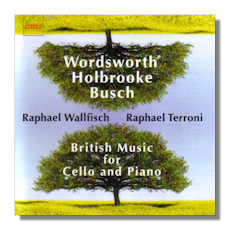
The Internet's Premier Classical Music Source
Related Links
- Latest Reviews
- More Reviews
-
By Composer
-
Collections
DVD & Blu-ray
Books
Concert Reviews
Articles/Interviews
Software
Audio
Search Amazon
Recommended Links
Site News
 CD Review
CD Review
British Music for Cello and Piano

- William Wordsworth:
- Nocturne, Op. 29
- Scherzo, Op. 42
- Sonata #2, Op. 66
- Sonata for Solo Cello, Op. 70
- Josef Holbrooke: Fantaisie-Sonata, Op. 19
- William Busch:
- Suite
- A Memory
- Elegy
Raphael Wallfisch, cello
Raphael Terroni, piano
British Music Society BMS436 76mins
This fine CD brings together substantial cello works by three London-born composers who, in spite of their significant contribution to British music, remain bereft of their due critical recognition.
The earliest of William Wordsworth's four works in this recital is the Nocturne, Op. 29 which he originally composed in 1946 for "viola da gamba" and subsequently arranged for cello. The short but delightful Scherzo dates from 1949, a period during which the composer was enjoying his greatest public success. The Second Sonata, Op. 66 is probably his most important cello-piano composition and was written in 1959, the year he met Shostakovich in the USSR. The dark-hued and often depressive language of the piece seems to suggest a certain audible bond between the two composers, and its casting in a single large movement with several contrasting sections is also reminiscent of many works by the famous Russian master. The 1961 Cello Sonata, Op. 70 is in three concise movements, and is composed, to some extent, in the form of J.S. Bach's solo suites. Nonetheless, Wordsworth's independence of mind and melodic invention are clearly defined.
Composed in 1904, Josef Holbrooke's "Fantaisie-Sonate" is his most substantial work in the genre, and brilliantly reflects the composer's devotion to chamber music, which permeated practically his entire artistic career. Born of naturalized German parents, William Busch studied piano with Wilhelm, Backhaus and Egon Petri.
A student and friend of Ireland and Bush, Busch's mature idiom seems to have been influenced by these two prominent composers as well as by Finzi and Ferguson, who were also two of his close friends. The Cello Suite, his most important composition in the genre, was written in 1943 for Florence Hooton, while the two short pieces "A Memory" and "Elegy" are among Busch's last compositions, written in June and July 1944 respectively. Performances are consistently assured, and the playing is never less than absorbing. Excellent notes and sonics complete an issue worth investigating.
Copyright © 2010, Gerald Fenech.





















